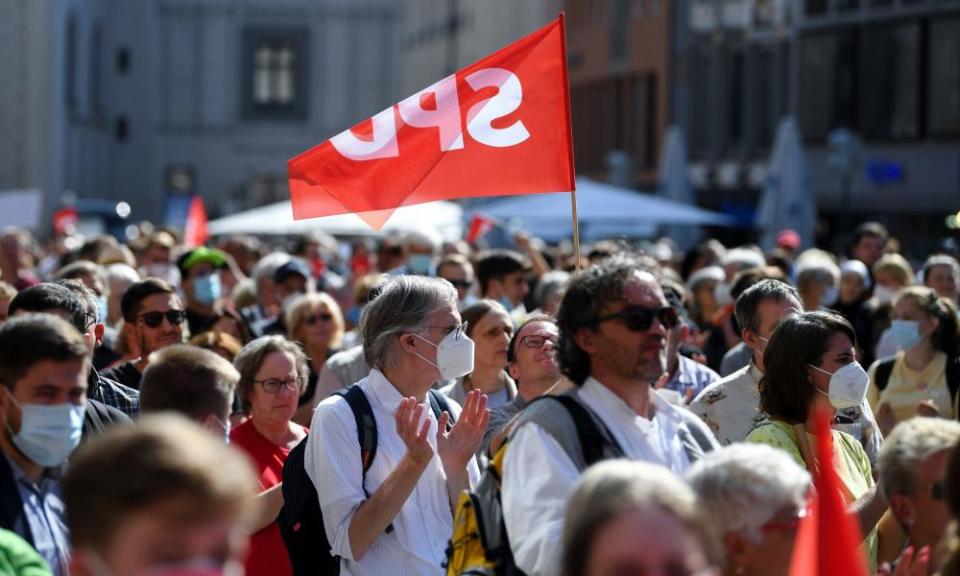German parties vague on pension plans as they court older voters

The churned-up garden of the clubhouse for pensioners is preoccupying Peter Klotsche. “It’s the raccoons,” he says. “They come at night and toss up the earth looking for worms and we really don’t know how best to stop it.”
The clubhouse, Stille Strasse, in northern Berlin, is abuzz with members wanting to put questions to local politicians before Sunday’s elections. The raccoons are a central talking point, as well as affordable housing and, not least, the future of the club itself, which remains at the centre of a struggle over attempts to turn it into luxury homes. A decade ago, its members squatted in it for more than 100 days to save it from developers.
“We certainly know how to stick up for ourselves,” says Klotsche, 80, who helps run the club. The retirees earned the respect of politicians and locals and are well aware of their might on a local level.
Nationally, older Germans are a force to be reckoned with. Over-65s make up more than a fifth of the electorate, and the figure is projected to be more than one in three by 2060. Over-60s are the most likely to vote, with an 80% participation rate.
It is an age group that no party wants to get on the wrong side of, which is perhaps why one of the nation’s most pressing issues, the future of the German pension, has been one of the least fleshed out during the campaign so far. Polling by the Bertelsmann Foundation places it as the third most important issue for voters, after the environment and immigration and ahead of eduction, housing and the coronavirus pandemic.
Klotsche, worked as a locksmith and welder for 55 years before retiring in 2001; his wife, Brigitte, ran a kindergarten. “We have not had it easy,” he says. He recalls the struggles of his generation to stay in work after the collapse of the communist East Germany, where they lived, and the fight for their pensions to fall more in line with those paid to workers from the former West Germany.
But when he puts his cross in the box on Sunday, he says, it will be his children and grandchildren rather than he and his wife whom he will be most concerned to look out for.
“I am worried that as the German population ages, there might not be enough for them and that they’ll have to carry the burden,” Klotsche says of his three sons, five grandchildren and eight great-grandchildren.
Germany’s pension system is a point of national pride for many, its forerunner introduced as the first of its kind in the world in 1899 under Otto von Bismarck. More than a century on, it has three main problems: a low birthrate over decades means fewer workers are paying into the system; rising life expectancy means more money is being paid out; and the generation whom Germans refer to as “die Baby-Boomer” have started to retire.
The main political parties have struggled for years to agree on a longterm formula to tackle the challenges, and manifestos for the 2021 election are vague.
Of the three leading parties in the polls, the Christian Democrats suggest establishing a “new form of supplementary funded pension provision”, the Greens propose encouraging private pension provision as well as establishing a sustainable publicly administered “citizens’ fund”, and the Social Democrats, for whom this is a bread and butter issue, have called for the retention of a benchmark pension for those retiring after 45 years of at least 48% of final income.
“But no party really dares to say in their election programmes what needs to be said, that is that either the increases in pension levels will be very slim in future … or tax and contributions will have to rise considerably,” said Mathias Brodkorb, the former finance minister of the northern state of Mecklenburg-Vorpommen, in a recent commentary on the issue, which he bluntly referred to as a “schmu” or “swindle”. He predicted that whatever party wins, voters are set for a “rude awakening”.
“I seriously don’t expect that when I retire the state pension will be able to cover my basic costs,” says Benedict Krejn, a painter from Saxony, who is 53 and says he has got used to the idea that the retirement age – currently 65 – is “certainly not fixed in stone”.
In just over two years it will start going up by two months a year until it reaches 67. But this summer an advisory committee of experts appointed by the government recommended that it be increased to 68 or 69 within 20 years if the system was to remain at all sustainable, calling the situation “illusory”. The committee said a quarter of the German budget is used to finance the pension system at present, and that could rise to 60% in the long term.
“I realise that something’s got to give, but I would just like some honesty from the government,” says Krejn. “I like my job, at least, and I’d have a few years to get used to it.”
As for Klotsche, he says that for the sake of his family he will place his vote with the leftwing Die Linke, who have pledged to raise the pension level to 53% of final salary, lower the retirement age back to 65 and introduce a minimum monthly pension of €1,200 for everyone.
“They helped us save the club, so I know I can rely on them,” he says.

 Yahoo Movies
Yahoo Movies 